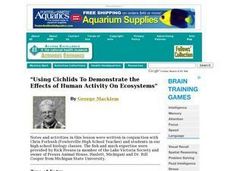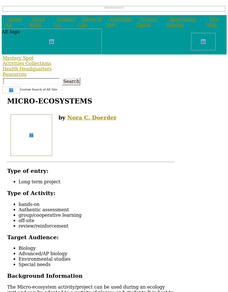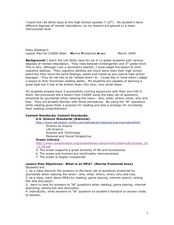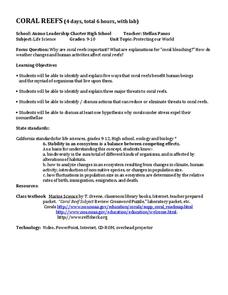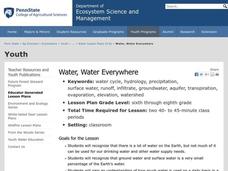Curated OER
Ecological Succession in Pond Water Cultures
Students collect samples of pond water, dried grass, and soil in a jar. They predict the order of ecological succession in their pond water cultures. They compare their expected results with their observed results.
Curated OER
"Using Cichlids To Demonstrate the Effects of Human Activity On Ecosystems"
Students explore the freshwater ecosystem of Africa's Lake Victoria by creating a freshwater aquarium. They investigate factors affecting the aquarium's ecosystem and conduct lab activities.
Curated OER
Plants and Animals
Seventh graders discover the interconnectedness of plants and animals in ecosystems. In groups, they create a food web and discuss the problems when one link of the chain is broken. To end the lesson, they set up a balanced environment...
Curated OER
Design a Reef!
Using a miniature coral reef aquarium kit, young ecologists model this unique ecosystem. They research various coral reef organisms and their niches, and they culminate the project by working together to write a report. Use this activity...
Curated OER
Micro-Ecosystems
Students create a sustainable, self-contained ecosystem in a ten-gallon aquarium.
Curated OER
Pond Ecology
Fifth graders examine pond ecology, testing how temperature affects the respiration rate of fish. They collect various living things found at a pond, and identify the animal and plant life discovered. They observe a pond community in an...
National Park Service
Living & Non-Living Interactions
What better way to learn about ecosystems than by getting outside and observing them first hand? Accompanying a field trip to a local park or outdoor space, this series of collaborative activities engages children in learning about the...
Curated OER
Personal Ecosystem
Young scholars build an aquatic ecosystem using large glass pickle jars. In this ecology instructional activity, students build and ecosystem then observe and collect data on the habitats. In this long term project young scholars...
Forest Foundation
The Web of Life
Producers, herbivores, carnivores, omnivores, decomposers. To begin a study of the forest ecosystem, learners examine the connections among the members of ecological communities.
Curated OER
Marine Protection Areas
Students explain the importance of having Marine Protected Areas. In this ecology lesson, students research MPA's in any of the Great Lakes. They play a MPA simulation game and identify MPA's on the map.
Curated OER
Pond Life Identification Kit
Students explore ecology and biodiversty. They use the wet-mount procedure to make several slides to view using the microscope and draw what they see.
Curated OER
The Environments of Big Sur:Which Do We Protect?
Students examine the California environments. In this environmental lesson, students examine the various ecosystems of California, creating a presentation on how these environments impact Big Sur. They write a paper defending their point...
Curated OER
Classroom Aquaponics: Exploring Nitrogen Cycling in a Closed System
Students investigate nutrient cycling in a simplified desktop ecosystem involving aquarium and hydro-ponically grown plants. They set up an aquarium with 10 gallons of water at least a week before the lab is planned and place...
Curated OER
Adaptation and Diversity on Sheffield Island
Written for an exploration of shoreline ecosystems on Sheffield Island, this gives ecology or marine biology buffs a hands-on experience. Using GPS or visual triangulation techniques, they lay transect lines on a high and a low energy...
Curated OER
Lotic Environment Lesson Plans
Students create and conduct experiments on a "classroom river habitat." They manipulate the biotic and abiotic factors so that they are able to compare an artificially prepared river model to a naturally occurring lotic ecosystem.
Curated OER
Coral Reefs
Students research coral reefs and identify their benefits to humans, threats to the reef, how to reduce and eliminate threats, and more. In this coral reef lesson plan, students research the reefs, and take a field trip to an aquarium.
Curated OER
A Symphony of Decomposers
Students discover decomposition. In this environmental lesson, students explore different types of decomposers and their role within the ecosystem. Students also discover how waste interferes with the decomposition process.
Curated OER
Zoobilation
Students research and use their findings to design a PowerPoint presentation and zoo-type habitat with the correct ecosystem for their animal group using a variety of materials such as cardboard boxes, aquariums etc.
Curated OER
Lotic Environment
Students assemble a classroom river model as an example of a lotic system. They control and measure biotic and abiotic information for the in-class system and compare data with a lotic system in a natural environment.
Curated OER
Water, Water Everywhere
Students recognize that all of the water on earth cannot be used for drinking and that the percentage of ground and surface water is a small percentage. In this water lesson students identify ways to conserve water.
Curated OER
A Reef of Your Own
Students research and study the life and reproductive strategies of reef building corals. They examine how coral reefs can produce high levels of biological material when they are surviving in areas of low nutrition.



